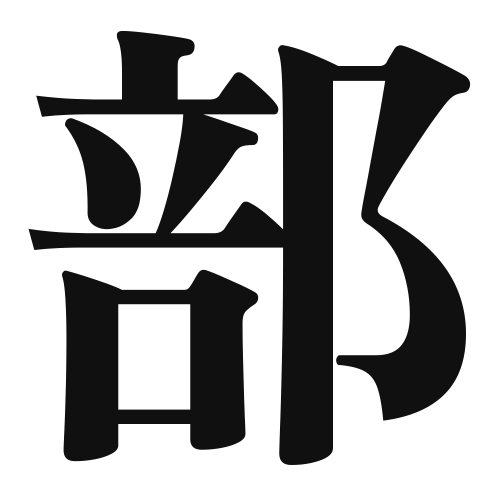1. Overview of Meaning
The kanji “部” (bu) generally means “part,” “section,” or “department.” It is used to denote a division or a specific area within a larger context, such as in organizations or physical spaces.
2. Origin and Radical
Origin of the Kanji: The kanji “部” is a compound character (会意文字) that combines the elements of “阝” (a radical meaning “hill” or “mound”) and “不” (meaning “not”). This combination suggests a place or area that is distinct or separate.
Radical: The radical for “部” is “阝,” which is often associated with geographical features or locations.
3. Examples of Usage
Common Words and Phrases: Some frequently used words that include “部” are:
- 部屋 (へや, heya) – room
- 部門 (ぶもん, bumon) – department
- 部活 (ぶかつ, bukatsu) – club activities
Example Sentences in Daily Conversation:
- 私の部屋はとても広いです。 (わたしのへやはとてもひろいです。) – My room is very spacious.
- 彼は営業部に所属しています。 (かれはえいぎょうぶにしょぞくしています。) – He belongs to the sales department.
4. Synonyms and Antonyms
Similar Kanji: A similar kanji is “課” (か, ka), which means “section” or “lesson.” While both can refer to divisions, “部” often implies a larger or more formal organization, whereas “課” can refer to smaller units or classes.
Antonyms: An antonym for “部” could be “全” (ぜん, zen), meaning “whole” or “entire,” indicating the opposite of a division or part.
5. Cultural and Historical Background
Relation to Japanese Culture: The concept of “部” is significant in Japanese culture, especially in organizational structures, such as schools and companies, where different departments or sections play crucial roles.
Proverbs and Idioms: One common expression is “部屋を分ける” (へやをわける, heya o wakeru), which means “to divide a room,” often used metaphorically to discuss separating responsibilities or tasks.
